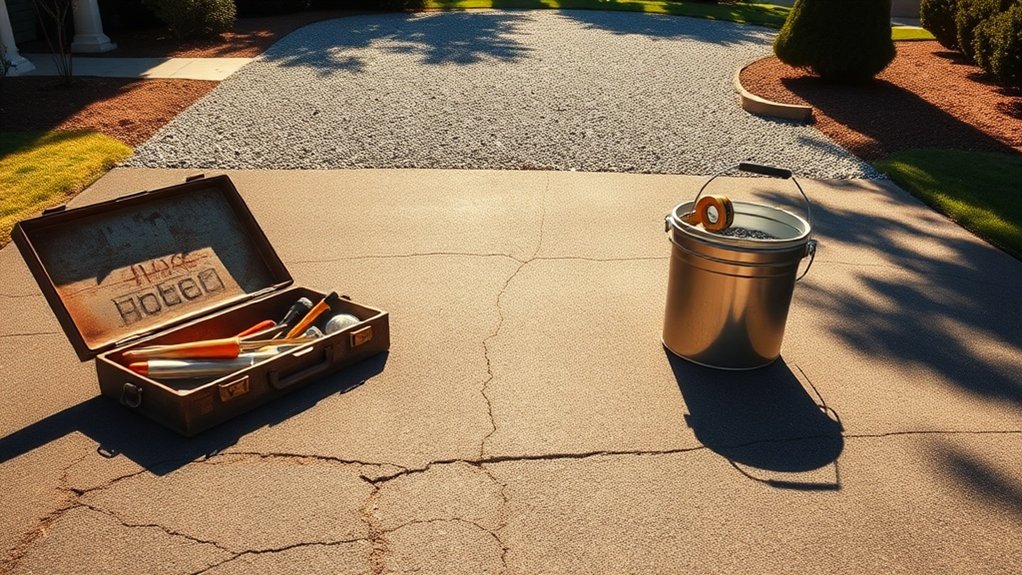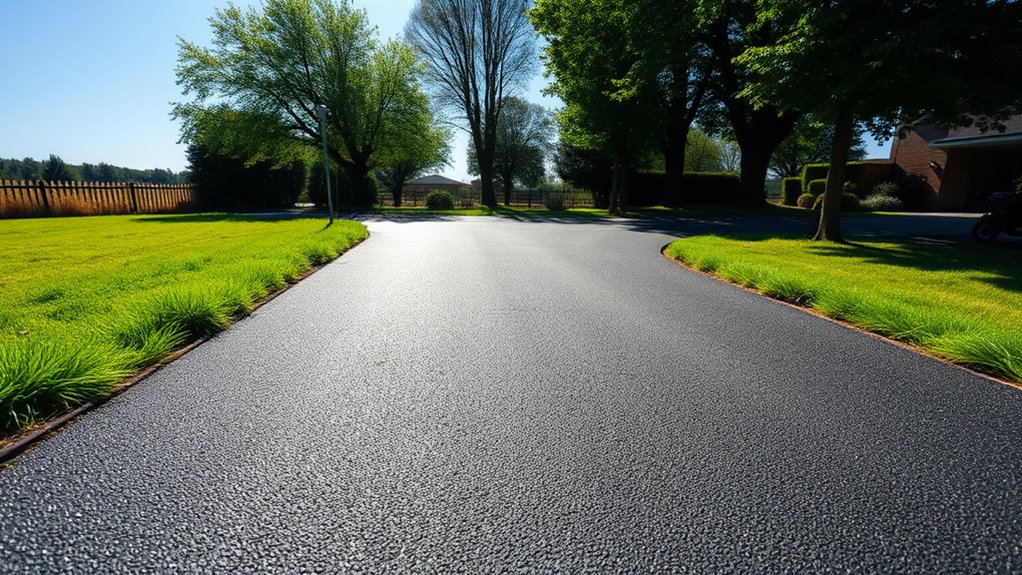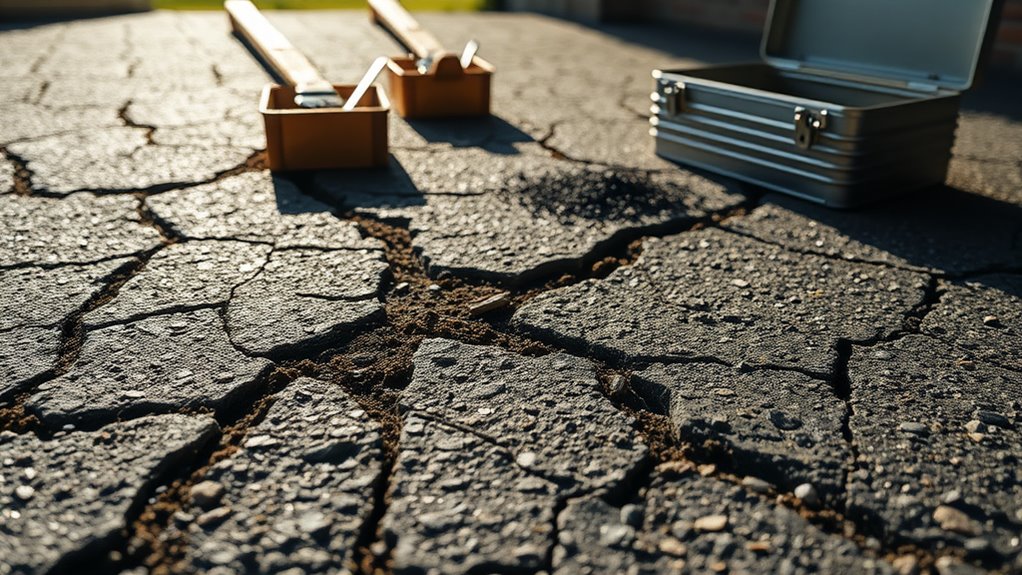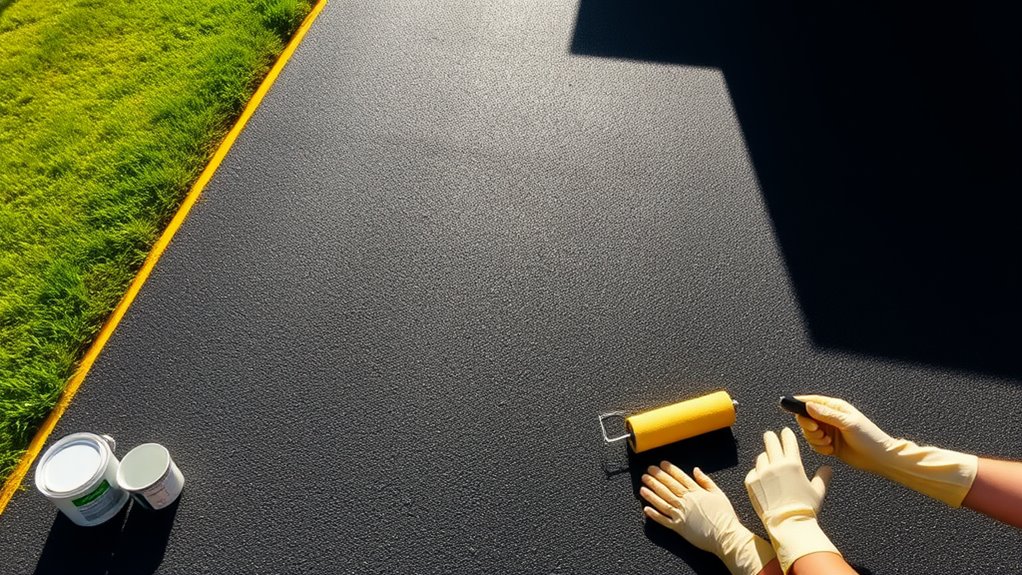Driveway maintenance and repairs can vary significantly in cost, typically ranging from £200 for minor tasks to over £8,000 for major work, depending on the material and condition of the driveway. For instance, sealing a block paving driveway may cost between £0.15 and £2.00 per square foot, while filling cracks in an asphalt driveway can range from £80 to £320. Knowing the specifics of your driveway can help you estimate total expenses and maintain its appearance. There’s plenty more to consider regarding costs and maintenance options.
Table of Contents
ToggleKey Takeaways
Driveway maintenance costs can vary significantly based on the material. For pavers, sealing every 3 to 5 years typically costs between £0.15 and £2.00 per square foot. Asphalt repairs can range from £80 to £1,600, depending on whether you’re dealing with crack filling, patching, or resurfacing.
Concrete maintenance is priced between £140 and £520 for minor crack repairs, with sealing costing around £0.70 to £1.70 per square foot. If you need power washing, expect to pay £0.10 to £0.30 per square foot for concrete, while asphalt cleaning can cost £0.40 to £0.80.
Keep in mind that your location and the size of your driveway can greatly impact these costs, potentially adding £3 to £15+ per square metre.
Understanding Driveway Materials
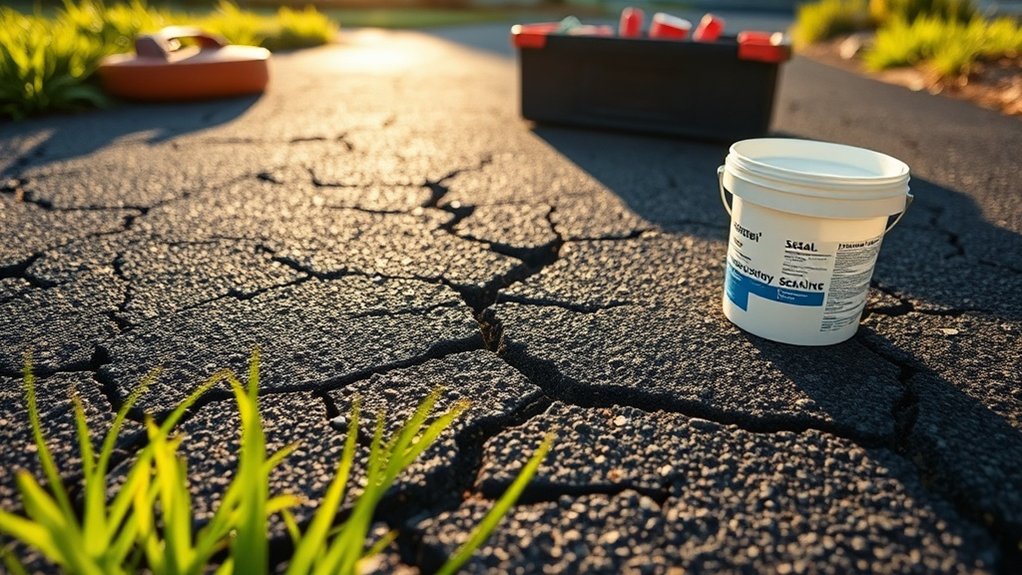
When it comes to driveway maintenance and repairs, knowing the various materials available is crucial for making a wise investment. Each option has its own longevity factors that can influence your decision.
For example, gravel driveways are cost-effective and provide excellent drainage, but they require regular upkeep due to shifting stones. Additionally, gravel driveways may create uneven surfaces over time, which can contribute to further maintenance needs. The high permeability of gravel allows effective rainwater drainage, making it particularly beneficial in areas with high rainfall.
Asphalt offers a smooth surface with a lifespan of up to 30 years, though it needs sealing every few years to maintain its condition.
Concrete is robust but can be prone to cracking, while brick driveways add a touch of elegance, albeit at a higher price.
Lastly, permeable pavers are environmentally friendly and promote drainage, making them a solid alternative. Incorporating Sustainable Drainage Systems (SuDS) in your driveway design can further enhance water management and minimize flooding risks.
Driveway Paver Maintenance Costs
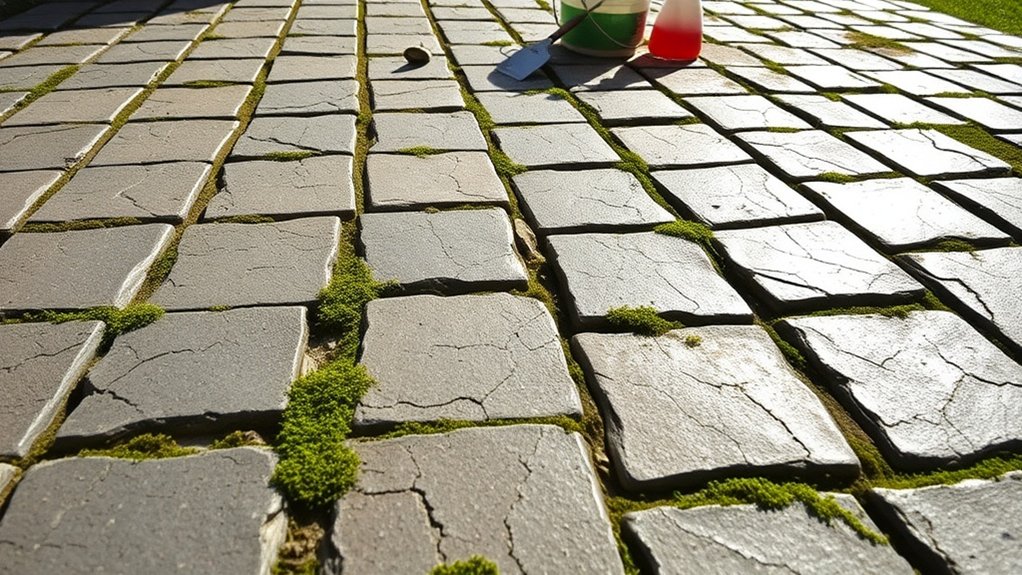
Choosing the right material for your driveway is crucial, particularly when it comes to understanding the ongoing maintenance costs associated with paver driveways.
Sealing your pavers is essential, with a recommendation to reseal every 3 to 5 years to prolong their lifespan. Costs for sealing can range from £0.15 to £2.00 per square foot, depending on whether you opt to do it yourself or hire a professional. Regular cleaning techniques can also enhance the durability of your pavers.
Annually, you should budget between £200 and £400 for routine maintenance, which includes sealing, weed control, and minor repairs. One of the advantages of paver driveways is that individual pavers can be easily replaced, making them a cost-effective option over time. However, keep in mind that some repair techniques may require professional expertise to ensure proper alignment. Additionally, with proper maintenance, concrete paver driveways can last 30 to 50 years, making them a durable investment.
Regular cleaning and maintenance of drainage are also vital for maintaining the performance and durability of your driveway, helping it to stay in excellent condition.
Asphalt Driveway Repair and Maintenance Expenses
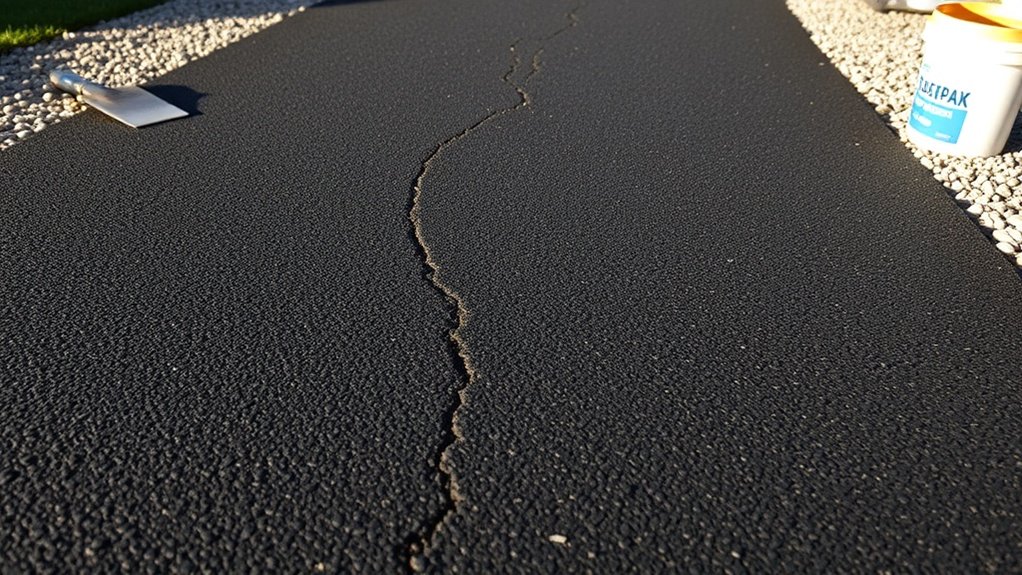
Asphalt driveways are popular due to their durability and affordability, but they do require regular maintenance and prompt repairs to remain in good condition.
To extend the life of your asphalt and minimise repair costs, consider the following expenses:
- Crack Filling: £80 to £320 to prevent further damage.
- Patching: £80 to £400 for pothole repairs.
- Sealing: £90 to £1,200 for protective sealcoating.
- Resurfacing: £400 to £1,600 for a new layer of asphalt.
The size and severity of the damage can significantly affect costs. Regular inspections and timely repairs can help you avoid more costly replacements, which can range from £2,500 to £8,000. Investing in maintenance now can save you money in the long run and keep your driveway looking its best. Additionally, regular sealing every 2 to 5 years can help prevent water damage and prolong the life of your driveway.
Concrete Driveway Maintenance and Repair Prices
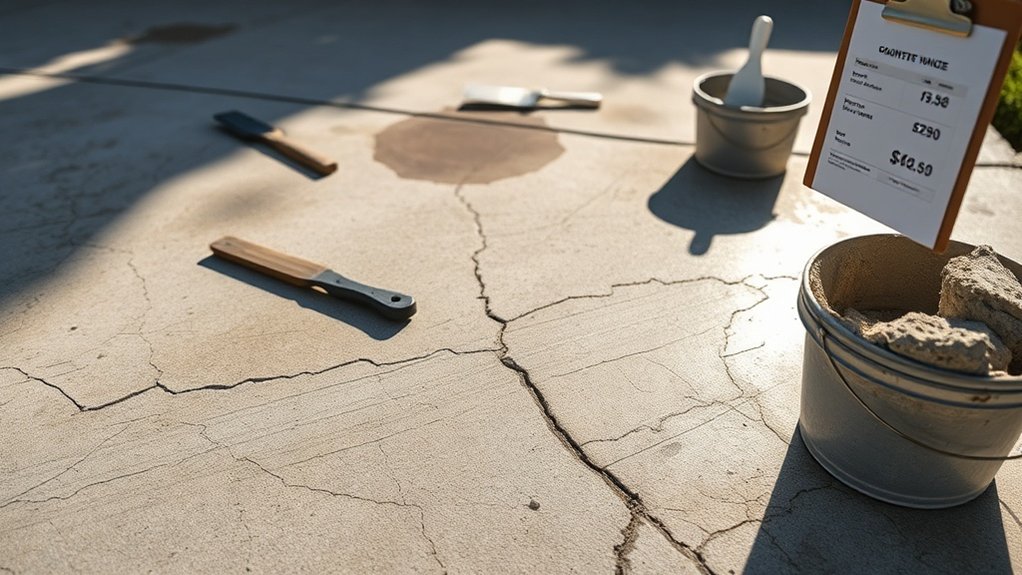
Maintaining your concrete driveway involves understanding the costs associated with crack repairs, sealing, and resurfacing.
Minor repairs can be quite affordable, but larger resurfacing projects can require a considerable investment.
By knowing the factors that influence pricing, you can make informed choices that help you save money in the long run.
For example, fixing small cracks early can prevent them from expanding and leading to more costly repairs later on. Regular maintenance, such as sealing the driveway, is crucial to extending its lifespan and avoiding expensive damage.
Repairing Cracks Cost Analysis
Repairing cracks in your concrete driveway can vary significantly in cost, depending on factors such as the size, depth, and severity of the damage.
Here’s a concise overview of potential costs based on crack severity:
- Minor cracks: Expect to pay between £140 and £520 for repairs, with filling costs around £0.40 to £2.40 per linear metre.
- Moderate cracks: Professional repairs can range from £80 to £800, influenced by the number of cracks present.
- Extensive damage: Patching or replacing slabs can cost between £5 and £12 per square metre.
- Specialised techniques: Methods like epoxy injection may raise costs but can provide long-lasting repairs.
Understanding these options can help you budget effectively and maintain your driveway for years to come.
Sealing and Resurfacing Expenses
Sealing and resurfacing your concrete driveway are vital for maintaining its durability and appearance, helping you avoid expensive repairs in the future.
Sealing costs between £0.70 and £1.70 per square foot and protects against moisture and stains. If your driveway requires more extensive work, resurfacing involves applying a new layer over the existing surface, which generally costs more due to materials and labour.
Expect to pay extra for higher-quality sealers like epoxy or polyaspartic, while acrylics are more affordable.
Regular maintenance every 2-5 years for sealing and every 10-20 years for resurfacing can significantly extend your driveway’s lifespan and enhance your property’s curb appeal.
Replacement Price Factors
When considering the costs of replacing your concrete driveway, several key factors can significantly impact your budget.
Here are four main aspects to keep in mind:
- Driveway Shapes: Straight designs tend to be more economical than curved or multi-level shapes due to lower labour costs and material requirements.
- Size: Larger driveways will need more concrete and labour, which can considerably increase your total expenses.
- Site Conditions: If you have poor soil or require grading, this can add between £2 to £25 per square foot, affecting your overall costs.
- Material Quality: Decorative or specialised concrete can range from £8 to £18 per square foot, so the finish you select will impact your budget.
Understanding these factors will aid you in making informed decisions for your driveway replacement.
Power Washing Costs Across Different Driveway Types
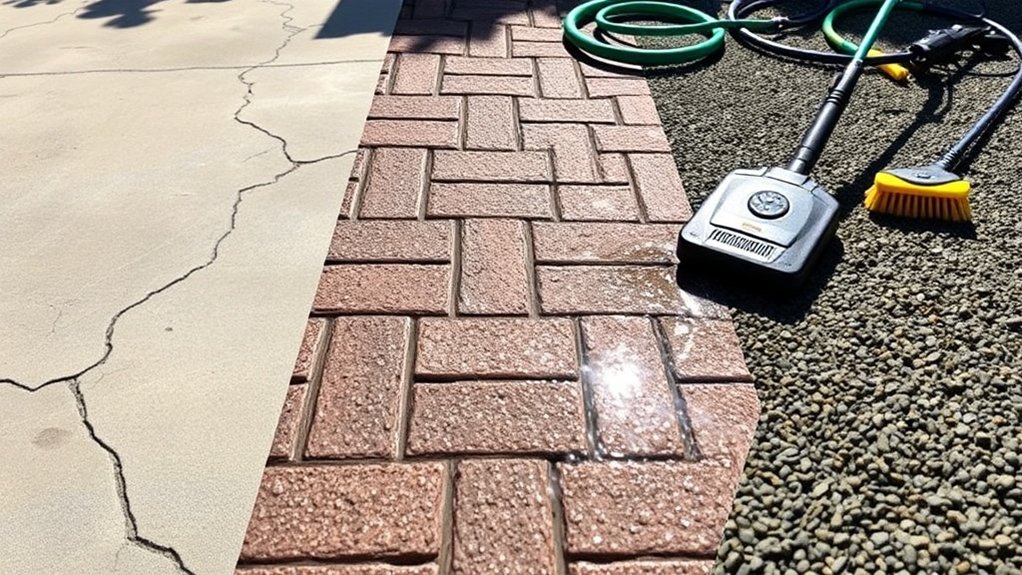
When considering power washing for your driveway, the type of material is crucial in determining costs.
Prices can fluctuate seasonally, and be aware of any extra service charges, particularly for stubborn stains or specialised techniques.
For instance, cleaning a block paving driveway may require more effort and thus cost more than a standard tarmac surface.
Being informed about these factors will help you budget wisely and ensure your driveway gets the care it deserves.
Cost Comparison by Material
Understanding the costs of power washing various driveway materials is essential for effective maintenance. Here’s a straightforward cost comparison for your driveway:
- Concrete: £0.25–£0.30 per sq ft (porous surface requires more cleaning time).
- Asphalt: £0.40–£0.80 per sq ft (sensitive to pressure, needs careful handling).
- Stone: £0.30–£0.60 per sq ft (textured surfaces can take longer to clean).
- Composite: Up to £1.50 per sq ft (most expensive, costs vary with material type).
Investing in power washing not only extends the life of your driveway but also maintains the durability of the materials.
Selecting the appropriate cleaning method for your driveway’s material is crucial for effective upkeep and cost efficiency.
Seasonal Pricing Variations
As outdoor cleaning services see increased demand during peak seasons, you’ll likely notice variations in power washing costs for your driveway.
In warmer months, service providers often raise prices due to higher operating costs. While concrete driveways may not require frequent cleaning, pavers and asphalt tend to need more attention because they’re more porous, particularly in humid climates.
Scheduling your cleaning in late autumn or early spring can lead to lower rates, as demand is typically reduced during these times.
Additionally, local market conditions and regional pricing differences can affect your costs, so it’s sensible to compare quotes from several providers to secure the best deal during off-peak periods.
Additional Service Fees
When getting your driveway power washed, you might expect a simple price quote, but there are several factors that can lead to extra service fees.
Here are the main things to consider:
- Driveway Material: Different materials require different cleaning techniques, which can affect the amount of work needed.
- Equipment Costs: If specialised high-pressure washers are required, the hire costs can add to your total.
- Service Surcharges: If your location is remote or difficult to access, you might incur additional fees.
- Optional Treatments: Using specific detergents for stains or mould removal can increase the final bill.
Being aware of these factors will help you budget accurately and avoid any unexpected charges.
Understanding potential surcharges and equipment costs enables you to make informed choices about maintaining your driveway.
Factors Influencing Overall Driveway Maintenance Expenses
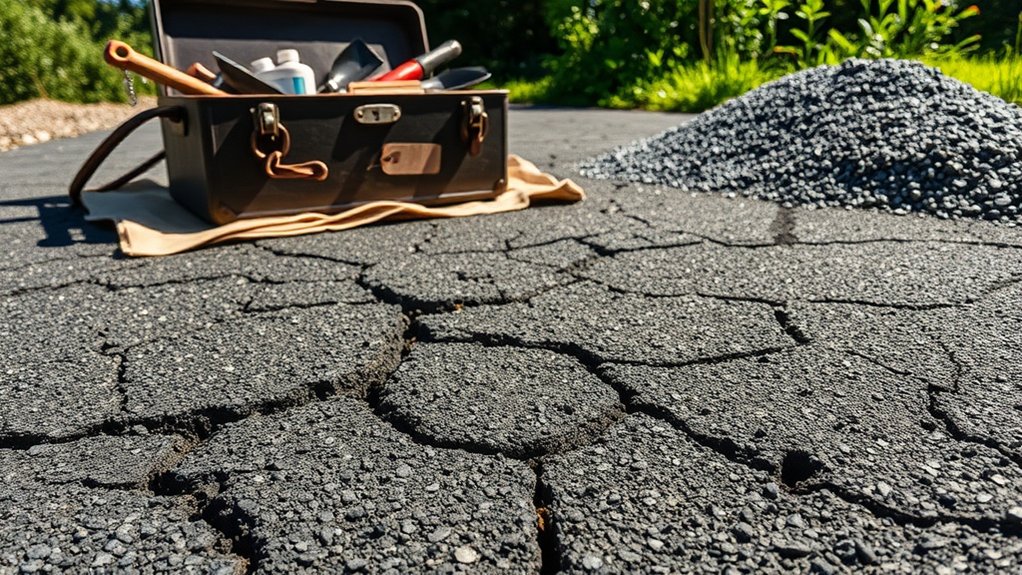
When it comes to driveway maintenance expenses, several key factors can significantly influence your budget. The material you select, the size and shape of your driveway, and local labour rates all play a role in determining costs. Additionally, site conditions such as drainage solutions and accessibility may also affect expenses. Here’s a brief overview:
| Factor | Impact on Cost | Considerations |
|---|---|---|
| Material Type | £5–£30 per sq. m. | Affects appearance and durability |
| Size & Shape | Larger = Higher Costs | Simple designs are more affordable |
| Site Preparation | £550–£1,800 for removal | Challenging conditions increase costs |
| Geographic Location | £3–£15+ per sq. m. | Urban areas tend to be pricier |
| Maintenance Needs | Regular upkeep required | Impacts long-term value |
Weighing DIY vs. Professional Driveway Repairs
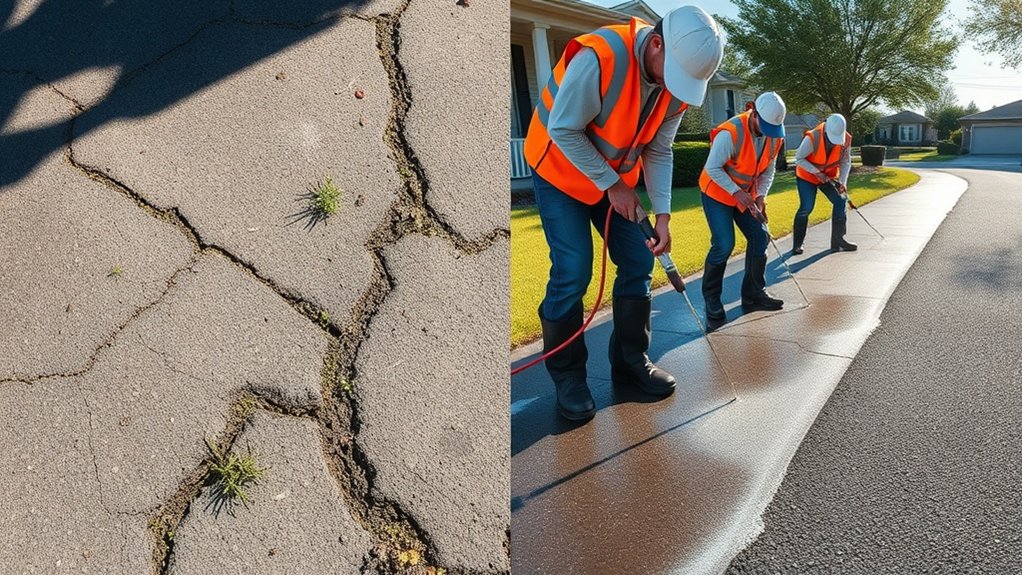
Understanding the factors that affect driveway maintenance costs can help you decide whether to handle repairs yourself or hire a professional. Here’s a straightforward overview of the key points:
- DIY Challenges: Small issues like minor cracks can be easily fixed, but larger problems often require skills beyond what most homeowners possess.
- Cost Comparison: DIY repairs generally save money, but remember that materials and tools can add up. Professional services, while pricier, offer a guarantee of quality.
- Time Investment: Taking the DIY route can be time-consuming, as it may involve learning new skills and possibly renting equipment.
- Professional Benefits: Professionals bring warranties, specialised tools, and can complete extensive repairs much quicker than an average DIYer.
Frequently Asked Questions
How Often Should I Maintain My Driveway?
You should maintain your driveway at least once or twice a year, depending on the material and how much it’s used. Regular upkeep not only improves its look but also significantly extends its lifespan. For example, if you have a gravel driveway, topping up the stones annually can keep it looking neat. If it’s tarmac, a sealant every few years can prevent cracking.
Can I Mix Different Driveway Materials?
Yes, you can mix different driveway materials, but be mindful of how they work together and their appearance. Ensure proper installation to avoid cracking, and select styles that complement each other for a cohesive look. For example, combining block paving with gravel can create an attractive, durable surface if done correctly.
What Weather Conditions Affect Driveway Repairs?
Weather conditions can significantly impact your driveway repairs. Heavy rain can lead to water damage, while temperature changes can cause cracks. For instance, extreme heat can soften asphalt, making it more susceptible to wear, whereas cold weather can create fissures. Regular maintenance, such as sealcoating, provides essential protection against these issues, helping your driveway remain both durable and visually appealing.
Are There Eco-Friendly Driveway Maintenance Options?
Yes, there are eco-friendly options for driveway maintenance! Use sustainable sealants and recycled materials for repairs. Regularly clear away debris, apply natural herbicides, and consider permeable surfaces to manage water effectively and minimise environmental impact.
How Do I Choose a Reliable Contractor?
Choosing a reliable contractor can feel like searching for a needle in a haystack. Start by checking their qualifications and credentials. Ask for detailed quotes that break down costs, so you know exactly what you’re paying for. Don’t forget to check references or reviews from previous clients to ensure they deliver quality work. Trust your instincts when making your decision!
Conclusion
Is driveway maintenance worth the investment? Definitely! Regular upkeep can save you from expensive repairs later on. While DIY may seem appealing, hiring professionals often ensures the job is done properly, which can prolong your driveway’s life. Keep in mind, the materials you select and the maintenance you provide will influence costs. By understanding these factors, you can make informed decisions and maintain your driveway’s appearance for years. Don’t delay—start planning your maintenance now!
Maximize the durability of your tarmac driveway by understanding the ideal weather conditions for installation—discover the secrets to perfect timing Read more
Discover the common causes of tarmac driveway cracks and learn effective repair methods to protect your investment—your driveway deserves the Read more
Before you paint your tarmac driveway, discover essential tips and techniques that can transform its appearance and durability—don't miss out Read more

